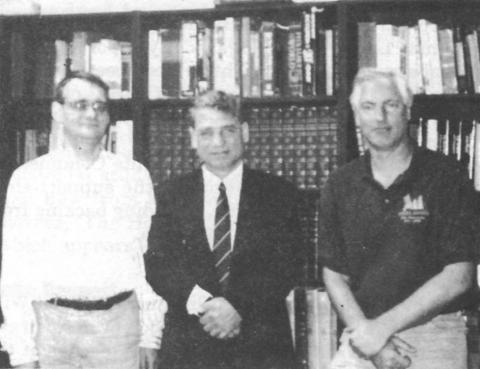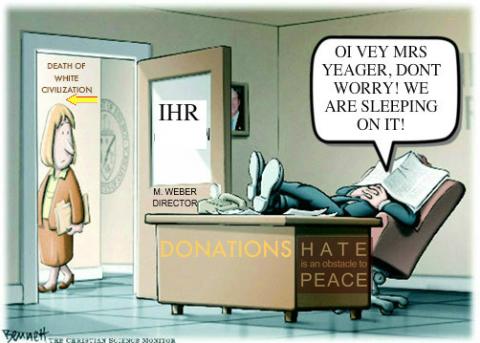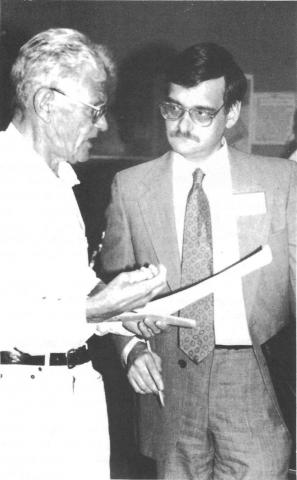The Unforgivable Sins of Mark Weber

From left: Mark Weber, visitor Fredrick Toben, Greg Raven at the IHR office in Southern California in April 1997.
By Carolyn Yeager
Mark Weber must be forced out of the IHR along with his Board of Directors and a brand new Board should be appointed by a committee made up of at least nine recognized historical/holocaust revisionists, each with a track record of honesty and commitment. This is the method Weber used in the early nineties when he played a major role in ousting founder Willis Carto from the IHR, so it can't be called unfair.
All the way back in 2004, one of the brightest lights in the holocaust revisionist movement, Germar Rudolf, dramatically pointed out Mark Weber's failings as Director in an article “IHR: Is the Ship Sinking?.” In April 2009, Robert Faurisson called upon Mark Weber to resign immediately from the Institute for Historical Review (IHR), after Weber published an essay with the title, “How Relevant is Holocaust Revisionism?” and answering in the negative, i.e. that it no longer was.The Director of the IHR, an organization founded for the purpose of combating “the hoax of the holocaust,” concluded his essay with this sentence: “In the real world struggle against Jewish-Zionist power, Holocaust revisionism has proved to be as much a hindrance as a help.”
After this, revisionist Paul Grubach put up an entire Blog “Mark Weber Must Go” and did a lot of research for it, but the participation, though impressive, was not enough to build a strong movement.However the Blog remains and should be read, especially by younger ones among us who are apparently not in the know. Weber consulted with no one amongst the revisionist community that he was supposed to be serving prior to publishing his new, shocking opinion. When questioned about it after the fact (for example by Arthur Butz, Faurisson and also long-time friend Bradley Smith, whose back and forth with Weber is detailed in the March 2009 Smith's Report -download the pdf), Mark tried to brush it off as nothing that serious. He basically refused to talk about it or to answer for himself. That was in 2009. Now, at the end of 2013, four and one-half years later, Mark Weber still sits in the Director's chair at the IHR, abandoned by all who made the IHR what it was in it's heyday, with only a 4-member Board of hand-picked “friends” to keep him drawing his salary of approximately $50,000.00 per year.
What Weber "earns" is based on how much in gifts and contributions he can keep flowing to “support the work of the IHR.” But the question becomes, What work? There is no work being done at the IHR, and certainly not in the sense of “historical review.” If the IHR is no longer about holocaust revisionism, what is it about? Robert Faurisson said Weber should establish another body “for the struggle against what Weber calls 'the Jewish-Zionist power'.” However, if he did, he would be as lackadaisical about doing any real “work” as he has been for the past 10 years at the IHR, so he's not about to take that step. Instead, Weber has opted to “sit it out” at “his” IHR, drawing as much income as he can from it, for as long as he can.
That says incredibly bad things about the character of Mark Weber.

Endzog's creative genius with visuals says a lot more than I can using many words. Thanks, Endzog, for this hilarious contribution, and for sending a lot of readers this way too!
This is a great example of what the revisionist community can do to apply pressure on Mark Weber.
How did it come to this?
Mark Weber turned 62 years old in October of this year. In 1992, at the vigorous age of 41, in the prime of life, he became editor-in-chief of the IHR's successful Journal of Historical Review print magazine, and almost from that moment the magazine-journal began to decline.(1) It's very last issue, vol. 21, #3/4 for May/June 2002—but sent out in August as May/August—was pathetic in both quality and size.
In spite of the questionable job Weber did as editor of JHR, in 1995 he became director of the IHR. With the decline of the Journal came also the decline in the energy and activity in the IHR as a whole. The Journal was, in fact, the expression of the IHR.
The first issue of the JHR came out in Spring 1980, the editor was Lewis Brandon (a pseudonym for David McCalden who came up with the idea for the revisionist institute to begin with). The first contributors were Arthur Butz, Robert Faurisson, Louis FitzGibbon, Austin App, Udo Walendy, Ditlieb Felderer and Charles E. Weber. The second issue, Summer 1980, was even larger. Issues #3 Fall and #4 Winter followed.
In the fall issue of 1981, there was already a change and J. Marcellus took over as editor.
The Spring issue of 1982 featured, “A note from the editor” Marcellus, which contained:
The issue you now hold in your hands marks the beginning of our third year of continuous on-time publication of The Journal of Historical Review -- an accomplishment of no small magnitude considering the incessant and sundry counter-efforts of the forcefully disagreeable.
You may notice that many of the pages herein have been set in a slightly smaller type and have a bit more depth. These improvements were incorporated with the distinct aim of bringing our readers an increased amount of reading without having to sacrifice to the higher costs associated with printing and mailing a heavier book.
But the sheer amount of quality Revisionist material available has been growing steadily of late, motivating us to make even further expansion plans for The Journal.
So, beginning with the next issue [Summer 1982], subscribers will be receiving a new 128-page quarterly rather than the usual 96-pages.
In Spring 1983 the editorship changed again and Keith Stimely took over. The content and quality of contributors continued to look very strong. The JHR was doing so well that on July 4, 1984 the office and warehouse of the IHR was attacked by arsonists and burned to the ground. In spite of this, all of the writings for the upcoming issues were re-written and issues 2,3 and 4 were combined in one very large issue for Winter 1984.
During 1985, no editor is listed on the table of contents. With the Spring 1986 issue, Robert Karl Berkel writes as the new Director of Publications, with Ted O'Keefe as Asst. Director. The year continues with a variety of excellent contributors. 1987-88-89 move along nicely, without a break in publication or in quality. Many new contributors show up and the annual conferences take place with exciting speakers.
The issues of 1990 and 1991 look a little different in content, but not much. In 1992, Mark Weber takes over as Editor, but his “Editorial Note” in the Spring issue has been de-hyperlinked or removed from the archive. It's impossible to tell how many pages in each issue because the page numbers for the articles don't make sense.
In 1993, the JHR becomes a bi-monthly publication, putting out six issues per year, rather than four. The Jan-Feb issue has only around fifty pages. I wonder if the type has gotten larger again? March-April has only 40 pages; May-June, 42. The rest of the year's issues follow about the same. In the final issue of 1993 Greg Raven wrote:
The Journal's first editor was David McCalden, a native of Belfast, Northern Ireland, who played a decisive role in the founding of the IHR, and wrote under the name of "Lewis Brandon." Longer on enthusiasm than on attention to detail, from 1978 until his departure in 1981, he was instrumental in the genesis of the revisionist movement.
From McCalden's departure in 1981 until 1982, J. Marcellus served as editor. Marcellus started at the bottom at the IHR and worked his way up to become director, a position he assumed in 1981 and holds today.
From 1982 through 1984, the Journal was edited by Keith Stimely, a gifted young writer who was astonishingly well-read, as can be seen by the number of book reviews he wrote during his tenure.
In 1986, the helm was assumed by Robert Berkel, a dedicated revisionist who served until publication of the Journal was suspended in 1987.
In 1988 it returned with the brilliant Theodore J. O'Keefe as editor. For the next four years, O'Keefe was virtually the voice of the IHR.
In 1992, O'Keefe passed the torch to our current editor, Mark Weber, who over the years had established himself as one of the most prolific contributors to the Journal, and a major contributor to the IHR Newsletter as well.
This was the beginning of the end for the JHR. Mark Weber was to prove to be its last editor and final undoing. He began by depending on more non-revisionist, current news-type material. Each issue was 40 pages or under. The July-August 1995 issue was only 16 pages!—according to the IHR archives. The years 1996 and 1997 were combined, or, there were no magazines published in 1996—one or the other. Mark was struggling to get out one now-30-to-40-page magazine every two months. The Jan-Feb. issue of 1999 was only 22 pages.
The Journal limped along, printing some previously-published material along with the new content in order to fill up its pages.The final issue was Vol 21, number 3-4 combined May-August 2002. It was only 29 pages, with no “Editor's Note” about ceasing publication. It was mostly about the 14th Annual IHR Conference, which was reduced to having people like Tom Sunic and Phil Tourney as speakers.This is the style of Mark Weber …
How Mark Weber took over
From 2002 to 2013, not much has taken place at the IHR. It only continued to shrink to the pathetic state it's in today, with Mark Weber sitting alone in his office, talking on the telephone, sending out his “News and Comment” mailer, asking for donations.

Right: Mark Weber speaks with Arthur Vogt at the 12th IHR Revisionist Conference in 1994.
The exodus of revisionist writers began after the big lawsuit calamity. Willis Carto went ahead and started The Barnes Review in 1994, a bi-monthy print journal dedicated to historical revisionism, including the holocaust, which attracted some would-be writers from the JHR. But the bigger reason for most revisionist writer's frustration and leave-taking was Mark Weber's obvious failure to get work done.He became the blockage in the previously pretty smooth-running operation.It is said that Mark would produce as long as someone was telling him what to do—as long as he had a boss, that is—but as soon as Mark became the boss, with no one above him, his habits changed.
I think that when all that money came in from the Farrell estate, Mark realized how well he could be taken care of via this Institute.And from then on, he worked to make sure he was a permanent fixture that could not be replaced. He volunteered to oversee the legal work to wrest control of the IHR for the anti-Carto faction. In 1993 they won and Tom Marcellus remained the Director. Mark was already editor of the Journal since the year before. In 1995 he was named Director. With a Board of Directors that supported him, Weber was now “in like Flynn.” The Institute felt pretty wealthy in those days, but with all that going for them, productivity dropped. And continued to drop. But money kept coming in.
Mark Weber has taken everything out of the IHR that he could, while he was giving less and less back. Perhaps, in Mark's mind, he has earned what he has there now, and is sacrificing for a cause. That most people who matter don't think so doesn't appear to trouble him as much as we might think it would. I really do believe that he enjoys, and even relishes, a sense of triumph … that, no matter what people may think, he won out. He has made sure of that by stacking the Board.
He possesses something that is important to him—he is, as the Director of an “Institute” that many people in the world recognize, a “somebody.” That weighs more than the fact that he has abandoned the mission for which the Institute was founded. The IHR is an “institute” without a cause; an “institute” that doesn't have a well-defined work to do. (The Institute website now points vaguely to "World Peace" as it's mission.) Embarrassingly, its only “cause” has become the maintenance of Mark Weber until he dies. That is so grotesque, it can only be seen as intolerable.
One of the worst things about Mark is that won't answer questions directly. Mark avoids all fights. He's a peace-nik who was probably influenced by the flower-children revolution of the 1970's and is absolutely worthless in battle. His style is to endure all attacks and insults without any response, and to avoid answering tough questions during so-called interviews by diverting attention to another issue of his choice. When he can't avoid answering, he generalizes as much as possible and then moves elsewhere, making the interviewer feel “rude” if he/she would continue to press it.
What to do?
The revisionist community should stop being passive about the IHR, should stop accepting “there is nothing we can do,” that “it's the decision of the Board,” etc. Instead, the revisionist community should show some determination and come together with an informational campaign to force Mark Weber to resign, or to force the current Board to fire him for malfeasance (dereliction of duty). The campaign should make it a major point to discourage contributions that simply help to keep Mark Weber hanging on. It should also discourage revisionist-friendly radio show hosts from inviting Weber as a guest and treating him as a “great asset to our cause.” These radio hosts need to see that they are either as lazy as Mark Weber or ignorant about the history of the IHR, or both.
The “revisionist community” in the sense I'm using now refers to ALL those who are sympathetic to the revisionist cause, not just what I call the “real revisionist researchers and writers,” past and present. If you people reading this, and there are hundreds more of you out there, want to see some real forward revisionist movement again, a most important step is to re-invigorate the IHR—which means getting rid of Mark Weber and putting a legitimate Board in place, who will appoint and oversee a legitimate Director. A Director whose world does not begin and end with himself.
Notes:
1. "since 1993 the IHR's productivity has been less than adequate.” Germar Rudolf, "Is the Ship Sinking?" http://www.vho.org/GB/c/GR/IHRCrisis.html
- 7113 reads









